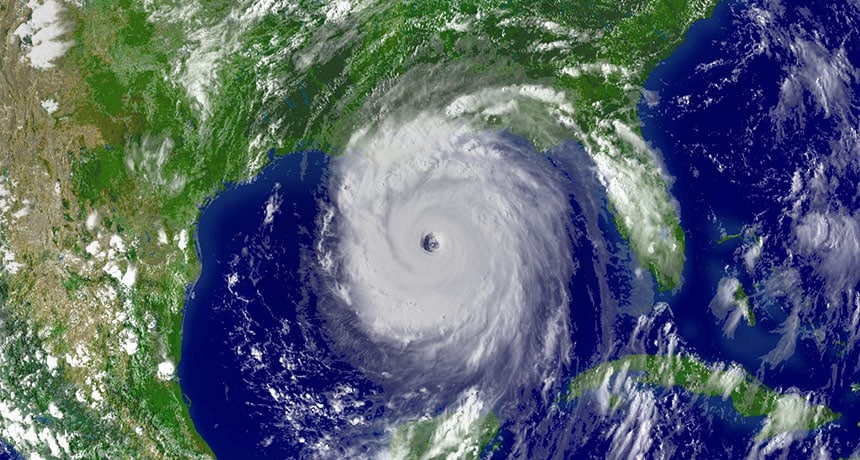
“Highly-Active” Atlantic Hurricane Season To Devastate Coronavirus-Stricken
The onset of extreme weather conditions, in addition to the prevailing Coronavirus health crisis, and the accompanying economic downturn will hit island nations of the Caribbean and Pacific regions like a “perfect storm”, warned Commonwealth’s Secretary-General Patricia Scotland.
Scotland stated that the Commonwealth has been trying to warn the world that some of the island nations are heading into a precarious time, fueled by these overlapping crises.
“We have three terrifying things intersecting.” Said Scotland
The COVID-19 health crisis and the worldwide economic shut down have collapsed tourism. This industry accounts for over 60% of the GDP in most of these island nations. Tropical storms and large devastating scale hurricanes used to be a rare occurrence in the past. They have now become more frequent, though. This makes the island states all the more vulnerable to perilous weather and climate change.
“These hurricanes aren’t coming every 72 years; they’re coming every other year and getting bigger and bigger.” She stated.
Island Nations Are Facing an “Existential Threat”
Scotland compared the increase in the magnitude of the 2020 Cyclone Harold to the 2015 and 2017 Tropical Storm Erika and Hurricanes Irma and Maria, respectively. She stated that these natural calamities have not only caused billions of dollars’ worth of damages in these island nations but in the U.S. as well.
The Caribbean nations might be destroyed by the new “hurricane season”. This is along with the fact that they are already facing an economic and health crisis with the coronavirus pandemic. These are some of the world’s most indebted nations, unfortunately. The economies of these countries will, resultantly, suffer greatly under these conditions.
“And this debt hasn’t come about because of their fiscal ineptitude-it has come about because they have had to respond to climatic and other events like the pandemic which are beyond their control.”
The U.S. National Oceanographic and Atmospheric Administration (NOAA) predicts that the Atlantic hurricane season, which starts from June 1 and ends on November 30, will register “above normal activity” in 2020.
“NOAA’s analysis of current and seasonal atmospheric conditions reveal a recipe for an active Atlantic hurricane this year.” Stated Neil Jacobs, acting NOAA’s administrator.
This intersection will likely develop into an “economic tsunami”. That intersection being the global pandemic and the onset of a highly active hurricane season. This is according to Scotland, who added that “vulnerable states are really at a point which will mean that many of them are facing that existential threat-no longer on one level, but on three.”
High Dependency on Tourism in Island Nations
The International Monetary Fund (IMF) warned that the global economy will likely be more severe than the Great Depression. The World Bank has estimated that the global gross domestic product (GDP) will shrink by 5% in 2020.
On top of the health crisis and economic recession, island economies, most of which depend on tourism, will take an additional hit from upcoming extreme weather conditions. In the Caribbean, the IMF estimated the sudden decline in tourism will contract the GDP by 6.2% in 2020.
“If you are primarily dependent on tourism as one of your mainstays, it makes you incredibly vulnerable during this period, and now we have the start of the hurricane season.” Said Scotland.
According to Moody’s Analytics, in the Bahamas, for instance, up to 80% of its GDP comes from tourism. It has now been greatly affected following lockdown measures and the closure of cross-border travel. Many tourists, mostly from developed economies, have had to cancel or reschedule their vacations. The economies from which these people come have also significantly stagnated due to the pandemic.
The future of these economies
March predictions by S&P stated that Sun, Sea and Sand-focused small island economies would be the hardest hit. Tourism will likely fall by 60%-70% in the Caribbean between April and December 2020. Some of the countries mentioned may be at higher risk of economic collapse. This includes Aruba, Barbados, Fiji, Cape Verde, and the Bahamas.
Following Cyclone Harold, a report was published by Refugees International. It stated that the Pacific Islands are the first in the world to deal with this “complex intersection”.
“The Pacific Islands may have been the first region in the world to deal with the complex intersection of COVID-19 and disaster-but they will not be the last. With the Atlantic hurricane season on the horizon-one that scientists predict will be more active than usual, the international community must reflect on the challenges of delivering aid during the COVID-19 crisis.”
The dire state of the forecasted economic news from island economies and other countries will further affect the global economy. This is specifically for those heavily reliant on tourism from richer countries, who are currently reeling from the pandemic.
Linked to the British Empire, the Commonwealth is a voluntary alliance of 54 member states worldwide. It has a population of approximately 2.4 billion people, some of which were British colonies.




